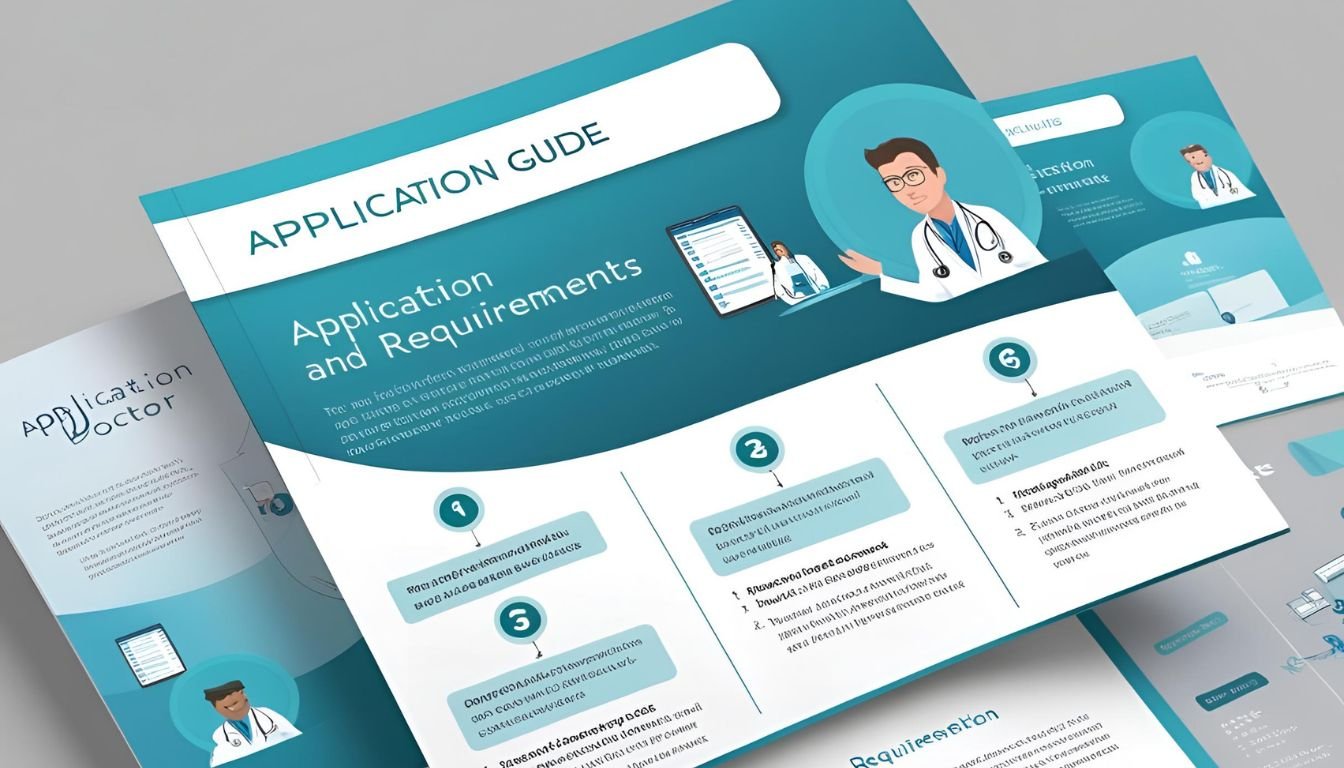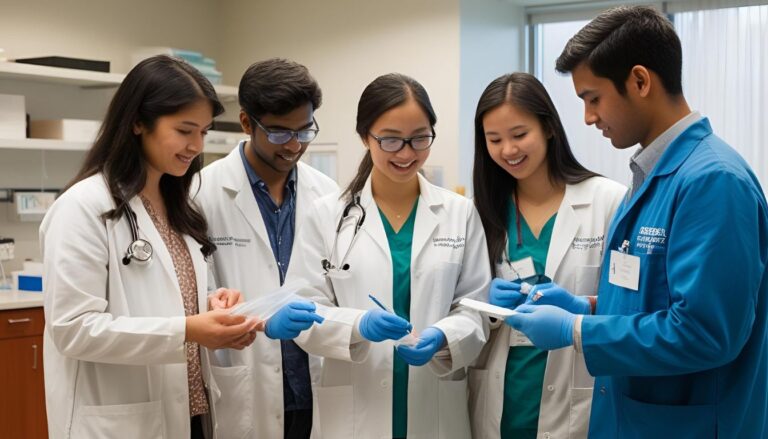Have you ever wondered why so many students are choosing to study medicine abroad? The answer lies in the unique opportunities that neighboring countries offer. For those seeking quality education at an affordable cost, one destination stands out.
With over 75 medical institutions, this country provides a blend of modern facilities and English-medium instruction. This eliminates language barriers and makes it easier for students to adapt. The course structure includes five years of academic training and a one-year internship, ensuring a well-rounded education.
What makes this option even more appealing is the availability of scholarships and low living expenses. Students can focus on their studies without worrying about financial burdens. If you’re considering a career in medicine, this guide will walk you through every step to make your dream a reality.
Why Choose Bangladesh for MBBS?
Medical aspirants often seek destinations that balance quality and affordability. This country stands out as a top choice for students aiming to pursue their dreams in the medical field. Let’s explore the key reasons why it’s a preferred destination.
Affordable Tuition and Living Costs
One of the biggest advantages is the cost-effectiveness of studying here. The tuition fees are significantly lower compared to private institutions in other countries. Students can save up to 60% on their education expenses.
Here’s a quick comparison of costs:
| Expense | This Country | Private Institutions Elsewhere |
|---|---|---|
| Tuition Fees | ₹20L | ₹60L+ |
| Living Costs | ₹2L/year | ₹5L/year |
Additionally, high achievers can benefit from the SAARC quota, which offers tuition waivers.
Globally Recognized Degrees
The degrees awarded here are recognized by prestigious bodies like NMC, WHO, and UNESCO. This ensures that graduates can practice medicine globally without any hurdles.
Students also gain access to modern facilities and English-medium instruction, making it easier to adapt and excel in their studies.
Cultural Similarities and Safety
Cultural parallels make it easier for students to feel at home. From Bengali cuisine to festivals like Durga Puja, the environment is familiar and welcoming.
On-campus hostels provide Indian food options, ensuring dietary preferences are met. Safety measures like CCTV surveillance and separate gender hostels create a secure environment for students.
With direct flights from major cities like Kolkata and Delhi, accessibility is another added advantage. The journey takes less than two hours, making it convenient for students and their families.
Bangladesh MBBS Application Process for Indians
Pursuing a medical degree abroad requires careful planning and preparation. Breaking the journey into clear steps ensures a smooth experience. Here’s a detailed guide to help you navigate the process efficiently.
Step 1: Check Eligibility Criteria
Before starting, ensure you meet the eligibility criteria. You need a minimum of 60% marks in Physics, Chemistry, and Biology in your 12th standard. Additionally, a valid NEET score is mandatory. The study gap should not exceed two years.
Step 2: Gather Required Documents
Collect all necessary documents to avoid delays. These include:
- Attested academic certificates
- NEET scorecard
- Medical fitness certificate
All documents must be attested through the Bangladesh Mission for verification.
Step 3: Submit Your Application
Once your documents are ready, submit your application to your chosen university. Most institutions follow a timeline from January to November for admissions. Ensure you apply early to secure your seat.
Step 4: Secure Admission and Visa
After receiving your admission letter, start the visa process. You’ll need:
- Invitation letter from the university
- Bank statements
- Police clearance certificate
Visa processing typically takes 4-6 weeks. Always verify the authenticity of agents through BM&DC to avoid scams.
| Phase | Timeline |
|---|---|
| Application Submission | January – March |
| Document Verification | April – June |
| Admission Confirmation | July – September |
| Session Start | November |
Following this structured approach will help you achieve your medical aspirations without unnecessary stress.
Eligibility Criteria for Indian Students
Understanding the eligibility criteria is the first step toward a successful medical journey. Meeting these requirements ensures you’re on the right path to achieving your academic goals.
To qualify, students must score a minimum of 60% in Physics, Chemistry, and Biology during their 12th standard. This threshold is essential for admission into most institutions. Additionally, a valid NEET score is mandatory, with cutoffs varying by college, typically around the 50th percentile.
Age is another important factor. Applicants must be at least 17 years old by December 31 of the admission year. This calculation ensures fairness and consistency across all candidates.
Study gaps are also considered. A maximum of two years is allowed, though exceptions may apply for medically documented cases. This flexibility helps students who faced challenges during their studies.
Unlike in India, there’s no requirement for NEET PG here. However, submitting forged documents can lead to lifetime bans, so honesty is crucial. For more details on guidelines, refer to the NMC guidelines.
- Minimum 60% marks in Physics, Chemistry, and Biology.
- NEET qualification with a 50th percentile cutoff.
- Age must be 17 or above by December 31.
- Maximum two-year study gap, with exceptions for medical reasons.
By meeting these criteria, you can confidently pursue your medical studies and focus on building a successful career.
Documents Needed for MBBS Admission in Bangladesh
Gathering the right documents is a crucial step for students aiming to study medicine abroad. Proper preparation ensures a smooth admission process and avoids unnecessary delays. Below is a detailed guide to the essential paperwork required for securing a seat in a medical college.
First, students must submit their academic records. This includes attested copies of 10th and 12th mark sheets and certificates. A valid NEET scorecard is also mandatory, as it serves as proof of eligibility for medical studies.
Next, personal identification documents are necessary. These include a birth certificate, nationality proof, and a passport valid for at least six months. Additionally, students must provide six to eight passport-sized photographs for official use.
Health and character verification are equally important. A medical fitness certificate, including HIV and hepatitis test results, is required. Students must also obtain a police clearance certificate, which involves a thorough background check.
Financial proof is another critical component. Guardians must provide bank statements showing liquid assets of ₹15-20 lakhs. This ensures the student’s financial stability during their studies.
Finally, all documents must be attested. Students can choose between apostille or embassy attestation, depending on their country’s requirements. Submitting documents before the October deadline is essential to avoid last-minute issues.
| Document Type | Details |
|---|---|
| Academic Records | 10th and 12th mark sheets, NEET scorecard |
| Personal Identification | Birth certificate, passport, photographs |
| Health Verification | Medical fitness certificate, HIV/hepatitis tests |
| Character Verification | Police clearance certificate |
| Financial Proof | Bank statements (₹15-20 lakhs) |
| Attestation | Apostille or embassy attestation |
By preparing these documents in advance, students can focus on their academic goals without unnecessary stress. Proper documentation is the key to a successful medical education journey.
Top Medical Colleges in Bangladesh for Indian Students
Choosing the right institution is a critical step for students aiming to excel in the medical field. With a variety of options available, it’s essential to understand the strengths of each college. This section highlights the top institutions, both government and private, that offer excellent education and facilities.
Government Institutions
Government medical colleges are known for their affordability and high-quality education. Dhaka Medical College, established in 1946, is one of the oldest and most reputable institutions. With tuition fees around ₹28 lakhs, it provides a cost-effective option for students.
Sir Salimullah Medical College stands out with its 160-year legacy of excellence. It offers a strong foundation in medical education and is recognized by prestigious bodies like NMC and WHO. Another notable institution is Chittagong Medical College, which is affiliated with a 2,500-bed hospital, providing extensive clinical training opportunities.
Private Institutions
Private medical colleges often cater to the specific needs of Indian students. Many offer 25% reserved seats, making it easier to secure admission. Bangladesh Medical College, with fees around ₹35 lakhs, provides modern facilities like AC hostels and Indian-style mess options.
These colleges focus on creating a comfortable environment for students. However, it’s crucial to verify NMC recognition before applying. This ensures the degree’s validity and avoids future complications.
Graduates from these institutions have successful careers globally. Many alumni work in prominent hospitals in the UK, USA, and India, including AIIMS. By choosing the right college, students can build a strong foundation for their medical careers.
Cost of Studying MBBS in Bangladesh
Planning your finances is a key step when considering studying medicine abroad. Understanding the expenses involved can help you make informed decisions and avoid surprises. Let’s break down the costs to give you a clear picture.
Tuition Fees Breakdown
Tuition fees vary depending on whether you choose a government or private institution. Government colleges are more affordable, with annual fees ranging from ₹3L to ₹5L. Private colleges, on the other hand, charge between ₹6L and ₹10L per year.
Here’s a comparison of tuition fees for popular institutions:
| Institution | Annual Tuition (₹) |
|---|---|
| Dhaka Medical College | ₹3L |
| Bangladesh Medical College | ₹6L |
| International Medical College | ₹8L |
| Delta Medical College | ₹10L |
Students under the SAARC quota can save significantly, with tuition waivers of up to 40%.
Living and Accommodation Expenses
Living costs are another important factor to consider. On-campus hostels are a popular choice, with monthly charges ranging from ₹8k to ₹15k. This includes basic amenities like Wi-Fi, security, and Indian-style food options.
Other monthly expenses include:
- Food and groceries: ₹8k – ₹12k
- Local transport: ₹2k – ₹4k
- Miscellaneous: ₹2k – ₹4k
Dhaka tends to be more expensive than suburban areas. For example, living costs in Dhaka average ₹25k per month, while suburban areas may cost around ₹18k.
Here’s a quick currency conversion tip: 1 BDT equals approximately 0.84 INR. This can help you budget more effectively.
By understanding these costs, you can plan your finances better and focus on your education without unnecessary stress.
Curriculum and Duration of MBBS in Bangladesh
Understanding the structure of a medical course helps students prepare effectively for their studies. The program spans five academic years, followed by a one-year internship. This comprehensive approach ensures students gain both theoretical knowledge and practical experience.
The curriculum is divided into four phases, each focusing on specific areas of medicine. Here’s a breakdown of the subjects covered:
- Phase I (1.5 years): Anatomy, Physiology, Biochemistry
- Phase II (1 year): Community Medicine, Forensic Medicine
- Phase III (1 year): Pharmacology, Pathology, Microbiology
- Phase IV (1.5 years): Medicine, Surgery, Obstetrics, and Gynaecology
Clinical rotations begin in the third year, allowing students to apply their knowledge in real-world settings. These rotations are conducted in affiliated hospitals, providing hands-on training in various medical disciplines.
The internship year is logbook-based and includes postings in both rural and urban hospitals. This exposure ensures students are well-prepared for diverse healthcare environments. Additionally, elective options in Indian hospitals are available for those seeking specialized training.
The syllabus aligns with the updated competencies of the National Medical Commission (NMC). This ensures graduates meet global standards and are eligible to practice medicine internationally. Support for exams like USMLE and PLAB is also provided, helping students pursue global opportunities.
Here’s a quick overview of the program structure:
| Phase | Duration | Subjects |
|---|---|---|
| Phase I | 1.5 years | Anatomy, Physiology, Biochemistry |
| Phase II | 1 year | Community Medicine, Forensic Medicine |
| Phase III | 1 year | Pharmacology, Pathology, Microbiology |
| Phase IV | 1.5 years | Medicine, Surgery, Obstetrics, Gynaecology |
By following this structured approach, students can build a strong foundation in medicine and achieve their career goals effectively.
Scholarships and Financial Aid for Indian Students
Financing education can be a challenge, but scholarships and financial aid make it easier. Many students rely on these opportunities to pursue their academic dreams. Let’s explore the options available to support your journey.
The SAARC scholarship is a popular choice for high achievers. To qualify, students must score at least 95% marks in their 12th standard. This scholarship requires annual renewal, ensuring continued academic excellence.
Embassy-sponsored programs, such as ICCR collaborations, also provide financial support. These programs are designed to help students from diverse backgrounds. They often cover tuition fees and living expenses, making education more accessible.
Need-based aid is another option for students facing financial difficulties. The application process involves submitting detailed financial records. Universities review these documents to determine eligibility.
During internships, students can earn stipends ranging from ₹15k to ₹20k per month. This helps cover living costs and provides valuable work experience. Always verify the authenticity of scholarship offers through official embassies to avoid scams.
For those who need additional support, education loans are available. Banks like SBI and HDFC Credila offer flexible repayment plans. These loans can cover tuition, accommodation, and other expenses.
| Scholarship Type | Eligibility | Benefits |
|---|---|---|
| SAARC Scholarship | 95% marks in 12th standard | Tuition waiver, annual renewal |
| Embassy Programs | ICCR collaborations | Tuition and living expenses |
| Need-Based Aid | Financial records review | Partial or full tuition coverage |
| Internship Stipends | Clinical training | ₹15k – ₹20k/month |
By exploring these options, students can focus on their education without financial stress. Scholarships and financial aid are essential tools for achieving academic success.
Conclusion
Embarking on a medical journey abroad opens doors to unparalleled opportunities. For students seeking a balance of quality and affordability, this country stands out as a top choice. With globally recognized degrees and a curriculum aligned with international standards, it ensures a strong foundation for a successful career.
The cost-quality advantage is unmatched, offering savings of up to 60% compared to other destinations. Graduates also benefit from a higher FMGE pass rate, enhancing their prospects in India. Whether you aim to take the NEXT exam or explore job opportunities locally, the options are diverse and promising.
Preparation is key to a smooth transition. Learning basic Bengali can ease daily interactions, while a detailed document checklist ensures nothing is overlooked. For guidance, reach out to the BM&DC helpline or the Indian High Commission for reliable support.
Start your journey today by downloading our comprehensive document checklist. Take the first step toward a rewarding career in medical education.





